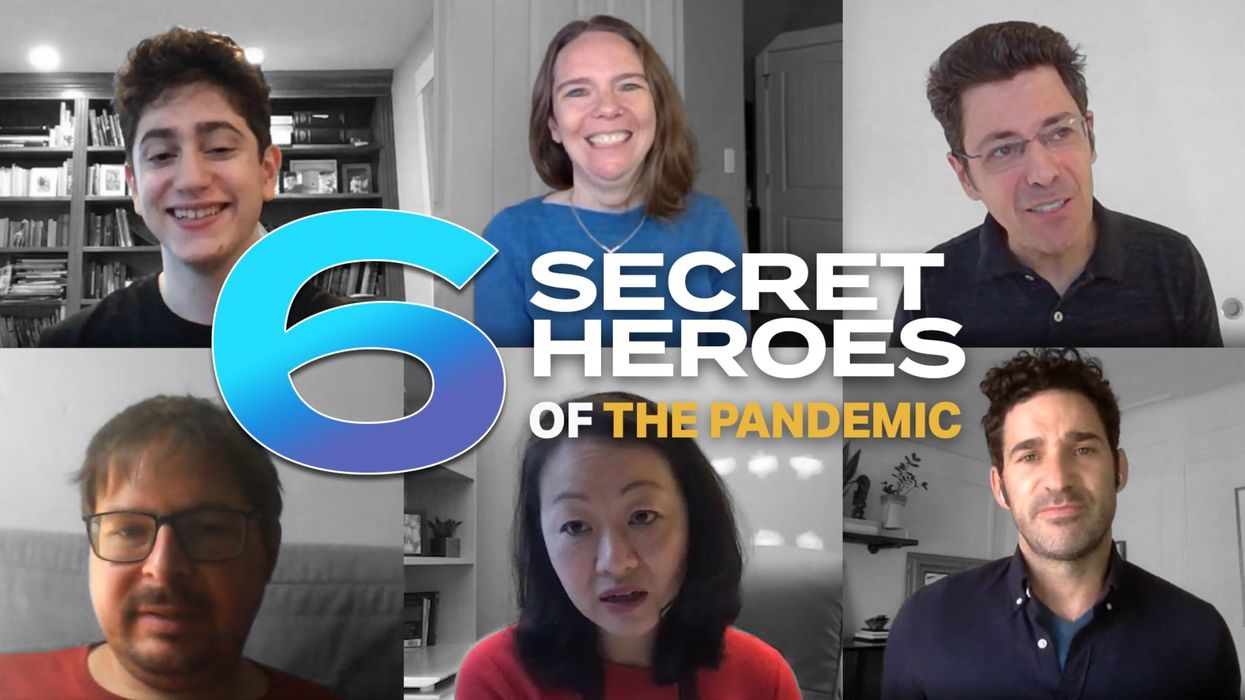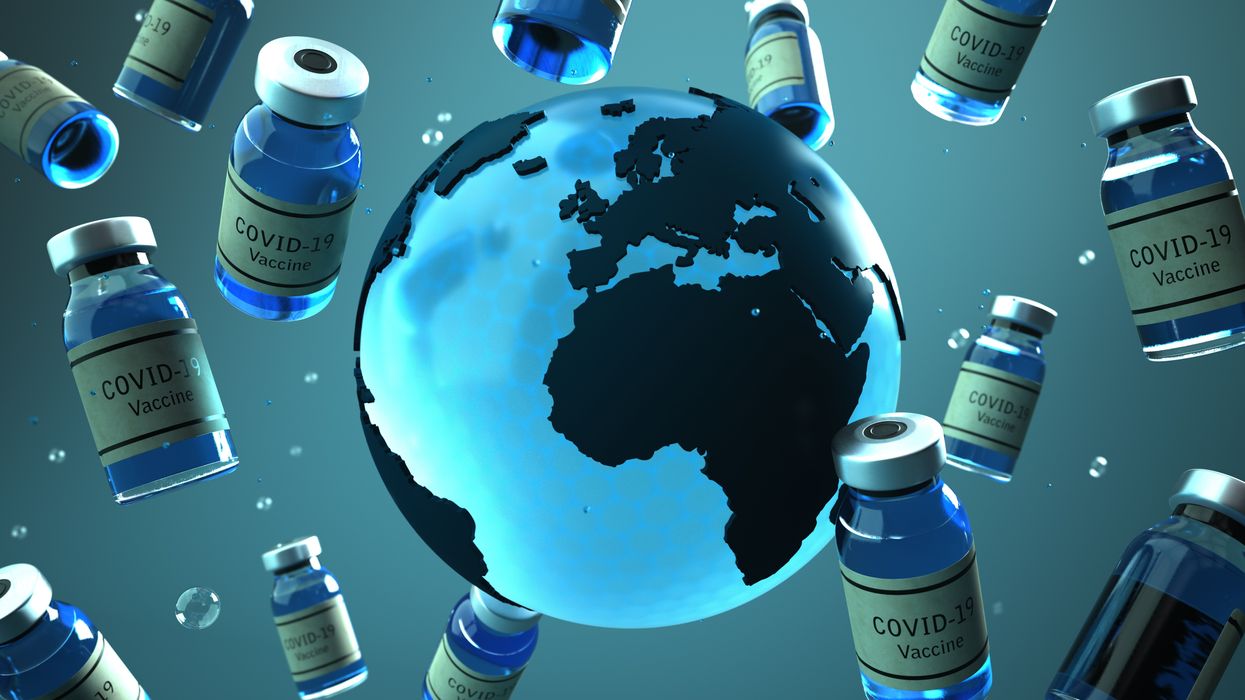A Team of Israeli Students Just Created Honey Without Bees

The bee-free honey on the left, and the Israeli team that won the iGEM competition.
Can you make honey without honeybees? According to 12 Israeli students who took home a gold medal in the iGEM (International Genetically Engineered Machine) competition with their synthetic honey project, the answer is yes, you can.
The honey industry faces serious environmental challenges, like the mysterious Colony Collapse Disorder.
For the past year, the team from Technion-Israel Institute of Technology has been working on creating sustainable, artificial honey—no bees required. Why? As the team explains in a video on the project's website, "Studies have shown the amazing nutritional values of honey. However, the honey industry harms the environment, and particularly the bees. That's why vegans don't use honey and why our honey will be a great replacement."
Indeed, honey has long been a controversial product in the vegan community. Some say it's stealing an animal's food source (though bees make more honey than they can possibly use). Some avoid eating honey because it is an animal product and bees' natural habitats are disturbed by humans harvesting it. Others feel that because bees aren't directly killed or harmed in the production of honey, it's not actually unethical to eat.
However, there's no doubt that the honey industry faces some serious environmental challenges. Colony Collapse Disorder, a mysterious phenomenon in which worker bees in colonies disappear in large numbers without any real explanation, came to international attention in 2006. Several explanations from poisonous pesticides to immune-suppressing stress to new or emerging diseases have been posited, but no definitive cause has been found.
There's also the problem of human-managed honey farms having a negative impact on the natural honeybee population.
So how can honey be made without honeybees? It's all about bacteria and enzymes.
The way bees make honey is by collecting nectar from flowers, transporting it in their "honey stomach" (which is separate from their food stomach), and bringing it back to the hive, where it gets transferred from bee mouth to bee mouth. That transferal process reduces the moisture content from about 70 percent to 20 percent, and honey is formed.
The product is still currently under development.
The Technion students created a model of a synthetic honey stomach metabolic pathway, in which the bacterium Bacillus subtilis "learns" to produce honey. "The bacteria can independently control the production of enzymes, eventually achieving a product with the same sugar profile as real honey, and the same health benefits," the team explains. Bacillus subtilis, which is found in soil, vegetation, and our own gastrointestinal tracts, has a natural ability to produce catalase, one of the enzymes needed for honey production. The product is still currently under development.
Whether this project results in a real-world jar of honey we'll be able to buy at the grocery store remains to be seen, but imagine how happy the bees—and vegans—would be if it did.
New Video: Secret Heroes of the Pandemic
These 6 people deserve to be widely known and celebrated for their brave and ingenious contributions to battling the pandemic.
Kira Peikoff was the editor-in-chief of Leaps.org from 2017 to 2021. As a journalist, her work has appeared in The New York Times, Newsweek, Nautilus, Popular Mechanics, The New York Academy of Sciences, and other outlets. She is also the author of four suspense novels that explore controversial issues arising from scientific innovation: Living Proof, No Time to Die, Die Again Tomorrow, and Mother Knows Best. Peikoff holds a B.A. in Journalism from New York University and an M.S. in Bioethics from Columbia University. She lives in New Jersey with her husband and two young sons. Follow her on Twitter @KiraPeikoff.
You're invited: A Fireside Chat with the CDC's Dr. Nancy Messonnier
This free, virtual event will address public concerns about the coronavirus vaccines' speed and safety, and their pending rollout.
EVENT INFORMATION
DATE:
Monday, December 7th, 2020 12:00pm - 12:45pm PST
This virtual fireside chat will provide Dr. Nancy Messonnier, Director of the National Center for Immunization and Respiratory Diseases, an opportunity to speak candidly to the public about the scientific integrity of the CDC, to address concerns regarding the speed and safety of coronavirus vaccines, and to discuss the government's work to distribute them quickly and equitably. She will appear in conversation with Nsikan Akpan, science editor at National Geographic. A public Q&A will follow the fireside chat.
CONTACT:
kira@goodinc.com
LOCATION:
Zoom webinar
HOSTS:
LeapsMag and the Aspen Institute Science & Society Program
REGISTER NOW
Nancy Messonnier, MD
Director of the National Center for Immunization and Respiratory Diseases, CDC
 LAUREN BISHOP - CDC
LAUREN BISHOP - CDC
Nsikan Akpan
Science Editor, National Geographic

Kira Peikoff was the editor-in-chief of Leaps.org from 2017 to 2021. As a journalist, her work has appeared in The New York Times, Newsweek, Nautilus, Popular Mechanics, The New York Academy of Sciences, and other outlets. She is also the author of four suspense novels that explore controversial issues arising from scientific innovation: Living Proof, No Time to Die, Die Again Tomorrow, and Mother Knows Best. Peikoff holds a B.A. in Journalism from New York University and an M.S. in Bioethics from Columbia University. She lives in New Jersey with her husband and two young sons. Follow her on Twitter @KiraPeikoff.

